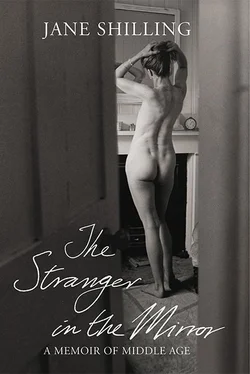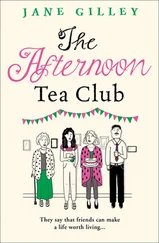We lack a personalised image of mortality – and into that void steps the figure of an ageing woman, for whom a real sense of loathing crops up in the most surprising places: not just in the horrified dismay of Susannah Constantine at the sight of her grotesque imaginary older self, but in the advice of newspapers and magazines on grooming for the older woman.
‘Acceptance is, in part, a solution. Keep buggering on,’ was the terse advice offered to middle-aged women by a journalist in a newspaper’s ‘Age Defiance’ beauty series. For 45- to 55-year-olds, the advice was, ‘should you have the stomach and the wallet for it, now is a prime time to embrace plastic surgery.’ But if courage or funds are lacking, ‘console yourself with the thought that age comes to us all, and that fresh-faced lovely who just caught the waiter’s eye before you will, in ten years’ time, find herself in precisely the same boat’.
As for the over-65s: ‘The good body now needs more medical help than maintenance… if you succumbed to breast implants in your younger years, now might be a good time to have them taken out, as a young woman’s bosoms on an older frame is not a good look. Besides, you are above all that now.’
By ‘all that’, the writer apparently meant sensuality, the desire to please and be pleased, to take (and bestow) pleasure with one’s appearance. She seemed to discount altogether the possibility of an older woman’s enduring power to fascinate. By her reckoning, ‘all that’ was a commodity so perishable that it had already begun to take flight by a woman’s mid-twenties (according to the article, the years from 26 to 36 are ‘when the rot sets in’).
What is strange about this account of women’s maturity is not just its grim tone: the need to shore up against decay beginning even before the prime of life has been reached; by the forties, a straight choice between plastic surgery or taking spiteful consolation from the thought that younger women will soon be as ugly as oneself; by 65, entirely desexualised – a woman only in the sense that one is not a man. There is also the writer’s evident sense that she is saying nothing unusual, simply articulating a universally acknowledged truth: that women begin to become physically repulsive soon after the first bloom of their youth has vanished, and what remains thereafter is a more or less heroic programme of resistance to the catastrophe of age, until the midsixties when all options are exhausted – at which point you have your breast implants removed and give up.
Germaine Greer devised a macaronic neologism for this sometimes veiled, sometimes quite explicit, loathing of ageing women: anophobia, she calls it, ‘from the Latin anus, meaning old woman’. And she notes how ‘the tradition of ridiculing older women seems neither to surprise nor to infuriate them… Fifty-year-old women laugh along with everyone else when male comedians guy whiskery-chinned shrieking old bags in ridiculous hats’.
This is prescient: she was writing more than a decade before Little Britain kept the nation in a roar of amusement at the antics of its terrible old women – the chatty old dear who pisses uncontrollably in public places; the tweedy ladies who project torrents of yellow vomit everywhere on learning that the vol-au-vent or slice of Victoria sponge they have just tasted was prepared by someone gay or from an ethnic minority.
The comedy is double-edged: hilarious as it is to see posh old women humiliated, their impregnable self-assurance ravaged by the base bodily functions that publicly overwhelm them, there is also an undertone of fear. These old women have no shame at all: beneath their cable-knit twinsets and pearls they are completely anarchic, like huge incontinent toddlers, with a toddler’s overweening egotism and lack of inhibition. There is no knowing what they might do or say. They are terrifying as well as despicable, unsightly and disgusting – a living affront to the world of the young.
On a personal level, Greer claims this waywardness, this outsider’s perspective on the world, as the means by which an ageing woman can reclaim an inward power and control over her own destiny once her powers of sexual attraction have waned: ‘Once we are past menopause we are all oddballs,’ she writes. This thought, or a version of it, evolved into the hugely popular Grumpy Old Women franchise of television series, books and innumerable other spin-offs, to which Greer is a notable contributor.
The premise of the series seems, at first glance, to be a sort of Old girl power: an affirmation of women’s comradeship, an insouciance about physical decay and the contempt of the young, a cheeky egging-on of one another about such manifestations of ‘grumpiness’ as complaining about poor service, or the dauntless confrontation of bad behaviour by youth in public places. Threading the comedy, though, is a disturbing strand of self-loathing.
In the Grumpy Old Women version of it, the poignant cessation of the struggle to stay young becomes a riotous celebration of grotesquerie. The pleasures of farting and nose-picking are vaunted as more than adequate substitutes for vanished sexual pleasure; the uncontrollable sprouting and sagging of increasing age pitilessly anatomised; men, old people, young people, sales assistants, bosses – in fact other people in general – energetically excoriated. From beyond the self-mockery there rises a pungent reek of melancholy, of discontent, of regret and envy of ‘people like Helen Mirren who looks maddeningly good for her age’.
For all its bravado, there is not an air of underlying serenity or security in its own position about the Grumpy persona. You have the powerful impression that the women who laugh along with the Grumpies are more than likely to be channel-flicking between that and 10 Years Younger , thinking that if only they had the nerve and the money they, too, would go for the veneers, the lipo, the face lift, hair extensions and the room full of admiring friends exclaiming about their miraculous rejuvenation.
Nowhere, either in the reflective Greer examination of the physicality of the middle years or in the commercialised Grumpy version of it, does there appear the notion that grace, allure, attraction (of which conventional beauty is an element, but not a necessary condition) might not be a perishable commodity of which one was granted a finite ration at birth, but a quality more in the nature of a talent of which one could make what one chose at different times in one’s life.
The ‘maddening’ good looks of Helen Mirren are maddening only because their owner insolently ignores the tyrannical idea of allure as the exclusive property of youth, which from middle age must either be faked or austerely relinquished. It is a peculiarity of the Hollywood concept of beauty, in which the UK is also saturated, to dismiss the notion, more common in the matriarchal cultures of Europe, of the power (and desire) to attract as a continuum: a quality retained throughout adult life, depending not on the firmness of one’s flesh, but the firmness of one’s sense of self. Not a fixed sense of the self one was when young, but a shifting sense of the self one becomes with experience.
The actress Penelope Keith, asked by an interviewer whether she had been approached to appear in Grumpy Old Women , said that she had – ‘But I’m an actress, not a turn.’ Which is a neat précis of the crisis of middle age, in which you wake one morning to find that you have been demoted from the star of your own life to a turn: your choice of roles limited to a handful of caricatures – old dear, battling crone, faux gamine. What woman, reading this in her late thirties or early forties, could think of herself as settling with any satisfaction into any of those personae in ten years’ time?
Читать дальше












